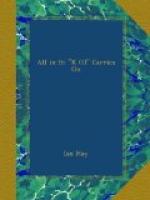At present we are indulging in such a period of repose; and we venture to think that on the whole we have earned it. Our last rest was in high summer, when we lay about under an August sun in the district round Bethune, and called down curses upon all flying and creeping insects. Since then we have undergone certain so-called “operations” in the neighbourhood of Loos, and have put in three months in the Salient of Ypres. As that devout adherent of the Roman faith, Private Reilly, of “B” Company, put it to his spiritual adviser—
“I doot we’ll get excused a good slice of Purgatory for this, father!”
We came out of the Salient just before Christmas, in the midst of the mutual unpleasantness arising out of the grand attack upon the British line which was to have done so much to restore the waning confidence of the Hun. It was meant to be a big affair—a most majestic victory, in fact; but our new gas-helmets nullified the gas, and our new shells paralysed the attack; so the Third Battle of Ypres was not yet. Still, as I say, there was considerable unpleasantness all round; and we were escorted upon our homeward way, from Sanctuary Wood to Zillebeke, and from Zillebeke to Dickebusche, by a swarm of angry and disappointed shells.
Next day we found ourselves many miles behind the firing-line, once more in France, with a whole month’s holiday in prospect, comfortably conscious that one could walk round a corner or look over a wall without preliminary reconnaissance or subsequent extirpation.
As for the holiday itself, unreasonable persons are not lacking to point out that it is of the busman’s variety. It is true that we are no longer face to face with the foe, but we—or rather, the authorities—make believe that we are. We wage mimic warfare in full marching order; we fire rifles and machine-guns upon improvised ranges; we perform hazardous feats with bombs and a dummy trench. More galling still, we are back in the region of squad-drill, physical exercises, and handling of arms—horrors of our childhood which we thought had been left safely interned at Aldershot.
But the authorities are wise. The regiment is stiff and out of condition: it is suffering from moral and intellectual “trench-feet.” Heavy drafts have introduced a large and untempered element into our composition. Many of the subalterns are obviously “new-jined”—as the shrewd old lady of Ayr once observed of the rubicund gentleman at the temperance meeting. Their men hardly know them or one another by sight. The regiment must be moulded anew, and its lustre restored by the beneficent process vulgarly known as “spit and polish.” So every morning we apply ourselves with thoroughness, if not enthusiasm, to tasks which remind us of last winter’s training upon the Hampshire chalk.




